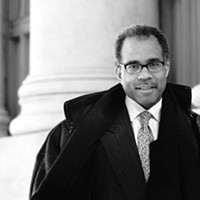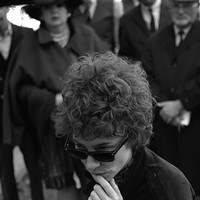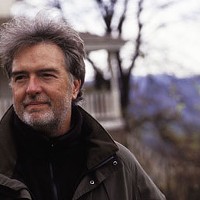

Page 2 of 6
"It's been great for me," he says after taping his segments. "I've been very lucky here, and also with my job at the Hollywood Reporter" -- where he's been a columnist since 1982 -- "in that I'm part of the package but I'm not in any corporation, and I understand how that works. Here I kind of work in my own unit. So I don't get into all that kind of stuff. I realize in any kind of corporation that's going to happen, but I'm lucky in that I don't have to get involved with that."
Robert Osborne is the last of a dying breed, a once-aspiring actor who turned into a Hollywood insider and historian -- an authority but a friend, a public face revered in private. He's always seemed to be in the right place at the right time, and if luck is when preparation meets opportunity, Osborne has prepared with the charm and knowledge to move up in a business swimming with sharks.
He talks about his career like he does movies, never making a cinematic reference without context. He mentions his Seattle stage work after graduating from the University of Washington with a journalism degree and recalls landing a role in a 1958 production: "The actor I was doing the play with was Jane Darwell, who'd won the Academy Award for playing Henry Fonda's mother in The Grapes of Wrath. And she said, 'You should come to California.' I could stay at her family's house, and I had some friends there."
His run of luck came in succession. He scored a six-month studio contract with 20th Century Fox -- easy to get back then, he says -- and started taking acting classes.
"Paul Henreid, who played opposite Bette Davis in Now, Voyager, came to visit a friend who was giving the class," Osborne recalls. "And he saw me, and he said, 'You know, I'm doing a TV western called "The Californians," and I'm directing an episode, and you'd be right for the guy for it."
The studio that owned the show, Desilu, was run by Lucille Ball and her husband, Desi Arnaz. He wound up being an assistant to Ball while trying to get his acting career going. She was more impressed with Osborne's curiosity and knowledge of movies and actors than his acting talent.
"She was fascinated by the fact that I was staying at Jane Darwell's house, because Lucy loved all the character actors she worked with. She was fascinated with the Edward Everett Hortons and the Donald Meeks, and those guys. ... She was fascinated that I knew who they all were. So that's kind of what attracted her attention to me, was my attention to old movies."
While Arnaz was off on his various extramarital affairs, Osborne says, Ball often turned her mansion into a repertory movie theater, inviting Osborne and his friends over to watch old movies and talk about the stars. Back then, there was no concept of "classic cinema" -- new movies opened, played and closed, never to be shown again.
"They were all [film] buffs like me," Osborne says, "and we all had these 16 mm projectors, and we had no money, but you'd borrow a print from somebody or somebody had a print, or you would get to know someone at a TV station who had a print and lend it to you for the weekend. And then you'd gather your friends together, and you'd pool your money together, and get some spaghetti and wine and watch these old movies.
"I had a friend who was a dancer in one of Ginger Rogers' nightclub acts ... and he'd show a movie and he'd get Ginger to come over to watch with us, and she would talk about how they did this or how they did that," Osborne continues. "These people loved us because we knew who they were and we cared who they were and we cared about the process."
Osborne's acting career lagged. He may be best remembered for a spot in "The Beverly Hillbillies'" 1962 pilot episode. Ball warned Osborne that a nice Midwesterner like him couldn't hang with the cutthroat New York actors in Hollywood. ("There'd be this part for a TV show that I'd go read for, and I'd say, 'Well, George Peppard would be much better for this part!' The completely wrong attitude.")
She encouraged him to match his journalism degree with his encyclopedic movie knowledge. Write a book, she said. Even if it's not good, it'll be impressive at a job interview. And so Osborne wrote a book on the Oscars that was unique in its inclusion not just of winners but also the nominees.


